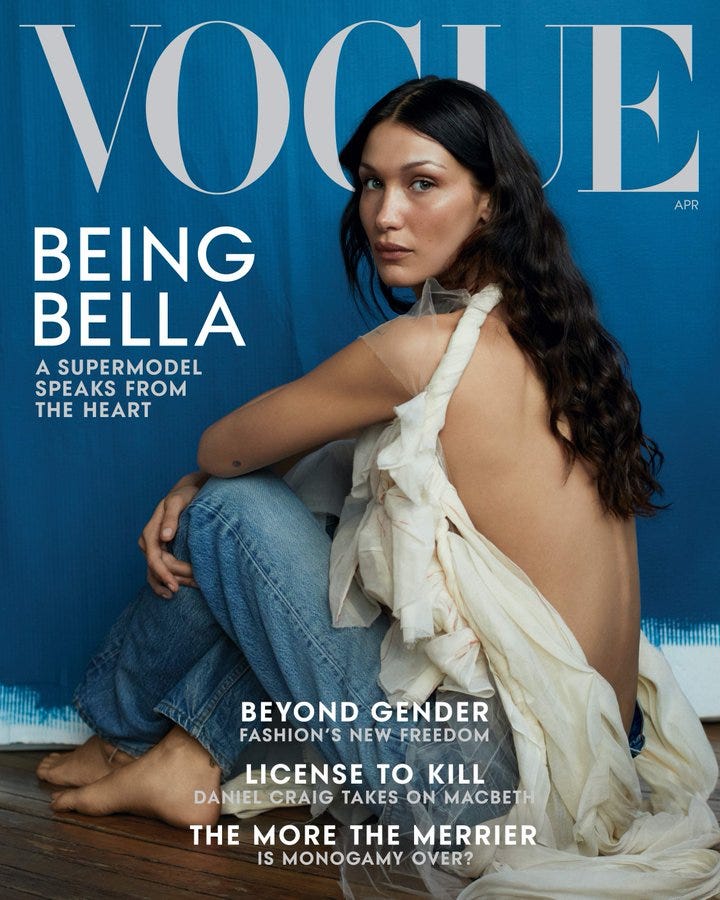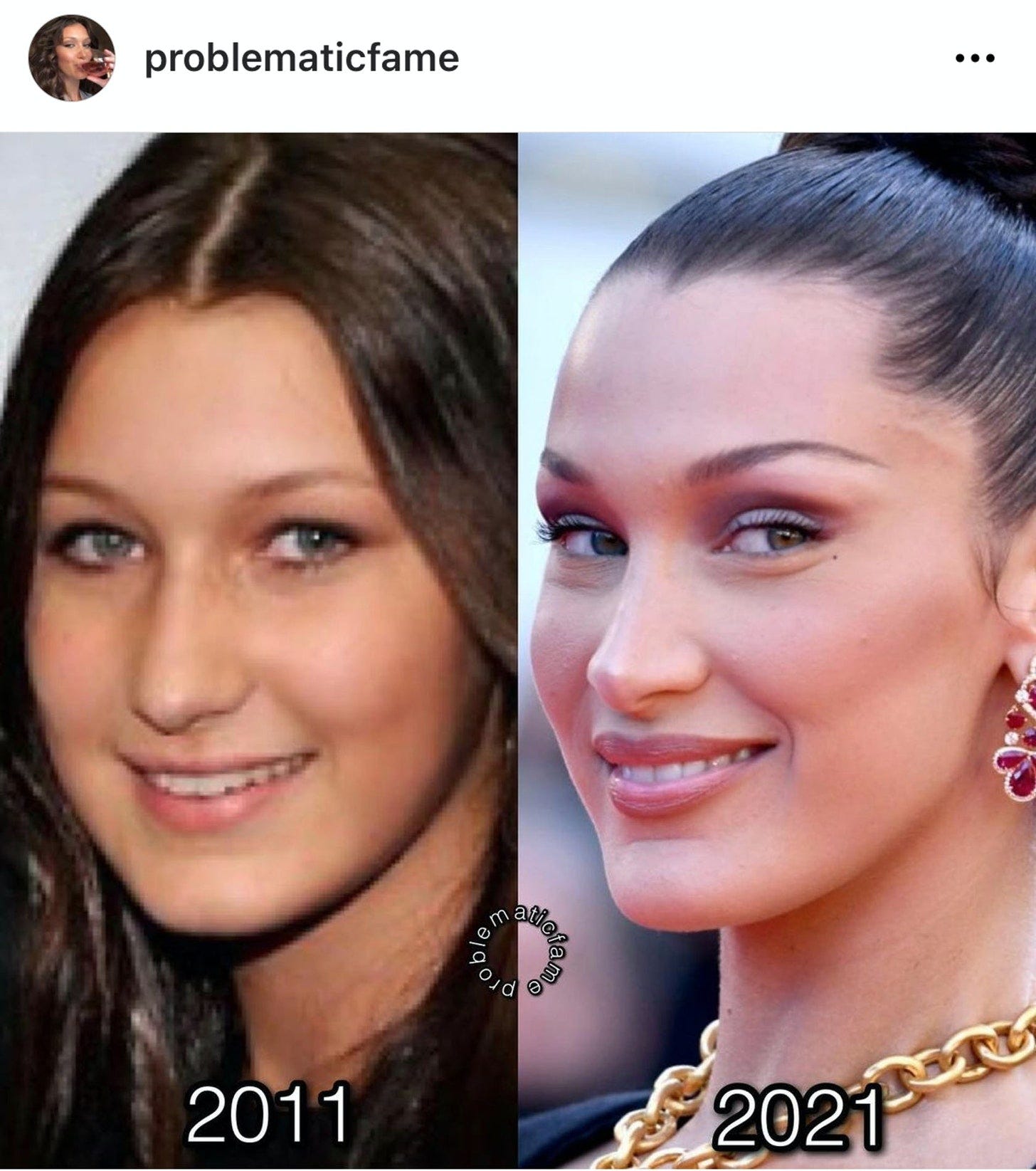By now, everybody knows: Bella Hadid got a nose job. The model admitted to the long-suspected surgery in a recent interview with Vogue. “I wish I had kept the nose of my ancestors,” she said. “I think I would have grown into it.” She was 14 years old at the time of her rhinoplasty.
The (literally) breaking nose news was covered everywhere — digital media, social media, the group chat — and from (almost) every angle: It was fodder for industry gossip, it was an example of how colonialism came for our faces, it was a debate about mothers and daughters and body autonomy under beauty culture. But for all the conversations this coverage started, I think it missed the poignant and universally-applicable point.
I will get to that point in a minute, I promise! But before that, for context, I want to acknowledge some of the more widely-shared theses on the subject.
First we have: The face as evidence of love!

Ooh, that tweet got me right in gut, the same generous and jiggly belly that birthed my great-grandmother and grandmother and mother and me. (I searched for the original quote it references but I couldn’t find it — if you know, please leave it in the comments!)
Next up: Eurocentric beauty standards as weapons of white supremacy.

I mean… I’ve been saying! I also reported on this a bit for Fashionista.com in 2019:
Nose jobs are less “trend-driven” than modifications like lip and cheek fillers — smaller, upturned noses have long been idealized in Western culture … But as conversations about inclusivity and diversity come to the fore, things are changing. The past few years have seen a call for more inclusive representation in the media, including a wider range of body types, skin colors, backgrounds and yes, facial features. Unfortunately, rhinoplasty is one body modification that can’t be reversed.
While plenty of people who’ve gone under the knife are thrilled with the results, the permanence of rhinoplasty does bring up a deeper issue for some: what to do when kids enter the picture. “I want to have kids in the future and don't think I'll be sharing my plastic surgery story with them, because I don't want them to feel the family pressure that I felt,” a source, who wished to remain anonymous, tells Fashionista. “Bumps” run in her family, and the fact that her mother and cousins had nose jobs to “fix” the genetic feature heavily influenced her decision. “If one of [my children] wants to change something, I'll support that, but I don't want to sway them,” the source says. “I was 19 when I did it, and I'm not sure I would make the same decision now at 29.”
The sentiment was echoed by another anonymous source who shared, “I am certainly going to do my best to ensure that my daughter never wants to undergo major surgery in order to feel pretty [like I did], but of course, if she did, I would be the first to understand.”
Through this lens, it’s not just the hyper-speed cycle of social media that’s influencing our future aesthetic preferences. It’s also the far-reaching impact of permanent cosmetic surgeries, which may perpetuate fragments of today’s beauty standards for generations to come.
Lastly: Beauty culture as a manifestation of the mother wound.
Critics have questioned why Hadid’s mother (Yolanda Hadid of “Real Housewives” fame) allowed her daughter get plastic surgery at age 14. Video clips of Yolanda Hadid telling Bella’s older sister, supermodel Gigi Hadid, to stop eating also resurfaced. Both examples, I think, illustrate how inherited beauty trauma fuels modern beauty beliefs. (Just look at this thread for more proof.)
Clearly, Hadid’s reference to the nose of her ancestors struck a powerful chord with people — but it’s the quote that followed that really struck me:
“I was the uglier sister,” Hadid told Vogue. “I was the brunette. I wasn’t as cool as Gigi, not as outgoing. That’s really what people said about me. And unfortunately when you get told things so many times, you do just believe it. I always ask myself, how did a girl with incredible insecurities, anxiety, depression, body-image issues, eating issues, who hates to be touched, who has intense social anxiety—what was I doing getting into this business?”
This! This is the juicy center of the interview!! This is the thing we should all be talking about, because it affects us all!!!
It is not strange that Bella Hadid felt ugly and insecure and anxious and depressed and still sought to be professionally beautiful. It is exactly how beauty standards are supposed to work. For everyone. I mean, sure, not everyone has taken a scalpel to the features of their forebears in order to emulate runway-ready beauty, but I’m willing to bet that everyone — everyone here at least, on this particular mailing list — has felt robbed of beauty and subsequently obsessed with attaining it.
Hadid’s words reminded me of a podcast I listened to a little while ago, a conversation between authors Glennon Doyle and Martha Beck. The concept of selfishness came up, and Beck said this:
“Selfishness is definitely a thing, and it happens when someone is starved of self. So if somebody holds a pillow over your face, you are thinking only about breath. But if you’re able to breathe freely, you don’t think about it at all. If you are able to be yourself, you don’t think about it at all. There are people who are very selfish and they’re mean and awful and you can be guaranteed that person’s self is being stifled to the point that they cannot think about anything else. And they can be really toxic, but it’s always because they’ve been robbed of their true selves. Separation from self is unbearable.”
Swap “self” for “beauty” and THIS IS BEAUTY CULTURE!!! Beauty culture creates the illusion of lack, it hollows out a void within us, it generates a hunger. It teaches us that beauty is purely physical (it’s not). It teaches us that our physical selves do not meet the criteria for beauty. It stifles actual beauty to the point that we cannot think about anything else. It makes us wild with the need to inhale it, consume it, become it.
Beauty culture instills insecurity precisely to encourage an obsession with standardized beauty, and all the behaviors that come with that obsession: constant product consumption; stunted mental, emotional, and spiritual growth by way of an all-encompassing focus on the physical form; seeding racist, colorist, sexist, ageist, ableist, consumerist, binary-enforcing values throughout society via adherence to Western beauty ideals (which, again, are the physical manifestations of all those -ists). It is all by design.
This — the deliberate suffocation of beauty — is what Hadid is describing in her Vogue interview. I think the more that we can acknowledge this, and identify this, and stop saying, “Oh, it’s so strange that I feel so ugly but still care so much about beauty,” and start saying “Oh, it’s so fucking typical of this exploitative system that I feel so ugly but still care so much about beauty,” the freer we will be.
And anyway, as Hadid and her nose now know, there is no real, lasting fulfillment to be found in manufacturing (supposed) beauty in the physical dimension alone. The “beauty void” is a psychological thing; a spiritual thing, even. One won’t and can’t and doesn’t fill the other. Our inherent human longing for beauty can only be satisfied when we, collectively, begin to understand beauty for what it really is: not a set of physical features, but an energy, a resource — a life force that’s in us and around us, everywhere, all the time, like oxygen.






“everyone here at least, on this particular mailing list — has felt robbed of beauty and subsequently obsessed with attaining it.“— 🤯🤯🤯
This article would have saved me many copays to a therapist.
This made me so sad when I read it. I also thought of all the trans kids who are now in danger of not having access to gender-affirming care, and how easy it is for straight, cis people to get surgeries like this. How flippant many parents are about it, how flippant our culture is about it. It also makes me think of Jennifer Grey, they actress from Dirty Dancing, who got a nose job after that role and totally changed her face. Our culture (and all cultures) is so aggressive towards any "look" that's outside the "norm" and the norm continues to be oppressively rigid. To say it bums me out is an extreme understatement.